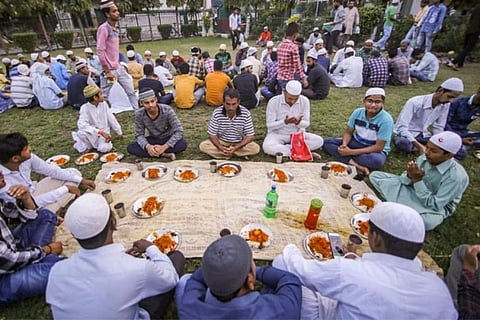

The city of Hyderabad is revelling in Ramzan delight. While iftar parties are being thrown throughout the city, two Hyderabad-based NGOs are providing iftar to jail convicts, one of the most scorned sections of the society. Majlis Dawat-ul-Islam and Jamaat-e-Islami have been quietly serving iftar to the jail inmates of Cherlapally and Chanchalguda jails for the past two decades.
Around 750 inmates every year follow the Ramzan fast in both prisons. This includes men, women and even children who are kept in juvenile homes.
While Majlis Dawat-ul-Islam has been providing food at the Cherlapally jail from the past 26 years, Jamaat-e-Islami, a prominent NGO from Malakpet, has been serving the Chanchalguda inmates from the past 15 years. Many city-based NGOs provide iftar meals for a day but these organisations have been providing iftar to the inmates throughout Ramzan.
Speaking to TNM, Khaja Ali Barbar, a member of the Majlis Dawat-ul-Islam, says that the organisation which is almost three decades old, has been providing food to the convicts since 1993. The group, which consists of around 12-15 members, make sure the fruits reach the Cherlapally jail by the time of adhaan every evening.
“It is mandated in the Quran that we provide food to the needy during the period of Ramzan. Jail convicts, many of whom are in the path of transformation, observe the fast in the most pious way possible. But they don’t get enough food in the jail premises after the day-long rigorous fast. Providing food to them ensures not a single person goes hungry to sleep after 14-15 hours of starvation,” Khaja Ali tells TNM.
Every year, the organisations seek prior permission from the jail authorities to distribute food to the inmates. A mix of fruits including dates and mangoes are provided to all the inmates who observe the fast. In the Cherlapally jail, around 400-450 inmates are observing the fast. In Chanchalguda, 300 prisoners, of which 40-50 are women, observe the fast.
Syed Nazir, a member of the Jamaat-e-Islami, says that they began providing iftar after the organisation’s president made a visit to the Chanchalguda central prison in 2004.
“He observed, contrary to expectations, there were a lot of inmates who observed the fast, but the jail authorities couldn’t meet their necessary food requirements. From then on, our group has been providing iftar fruits to the inmates, pooling money from our own pockets every year,” Nazir tells TNM.
Both the organisations vouch that not a single rupee is sought from people outside the NGOs and around Rs 2-3 lakh is required every year to feed the inmates throughout the Ramzan month.
“The custom has been that we ourselves fund the iftar and sometimes appeal to people from our close circles to donate money. There are also well-wishers who donate money every year voluntarily,” Nazir says.
Until a few years back, the members of the NGO themselves were allowed to distribute the fruits among the inmates. “We were also allowed to arrange iftar inside the jail and also were occasionally allowed to give sermons to the inmates. But now, we are restricted from entering the jail premises and have been asked to hand over the fruit baskets directly to the jail superintendent,” Khaja Ali says.
Talking to TNM, VK Singh, deputy general of the prisons department, says that the law has been enforced keeping in mind the security concerns in the jail. “Also, religious sermons can sometimes agitate the people belonging to other religions outside the jail. So in order to avoid religious bias, we have brought the restrictions in place,” the officer adds.
While the NGOs ensure the inmates have a proper iftar every evening, the jail authorities are also doing their bit, says VK Singh. “We keep food ready by 4 am every day so that none of the prisoners are hungry after performing their morning prayers. We also provide them with a small iftar in the evening and make sure they have their dinner on time. Also, during the Ramzan time, all Muslim inmates are put together in the respective male and female barracks so that they can carry on their religious rituals in their own ways.”